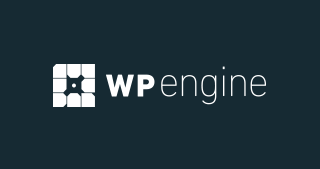Udacity and Coursera are two of the most popular online learning platforms, both offering a wide range of courses. However, they cater to slightly different audiences and have unique features that set them apart. This detailed write-up will compare both platforms, covering an overview, key features, pricing, frequently asked questions (FAQ), and a final conclusion to help you decide which platform is the best fit for your needs.
Overview of Udacity and Coursera
Udacity Overview:
Udacity, founded in 2011, started as a spin-off from free computer science classes offered at Stanford University. It has since evolved into a leading platform focused on teaching industry-relevant, hands-on skills in areas like technology, business, and data science.
Udacity is known for its Nanodegree programs, which are short, practical courses designed to equip learners with real-world skills that are directly applicable to the job market. These programs often involve projects and assignments created in partnership with top companies like Google, IBM, and Amazon. The primary goal of Udacity is to prepare learners for high-demand tech careers through specialized programs that emphasize practical, project-based learning.
- Primary focus: Technology, business, and data science
- Learning style: Project-based, hands-on learning
- Signature offering: Nanodegree programs
- Target audience: Individuals looking to gain job-ready skills in tech and business
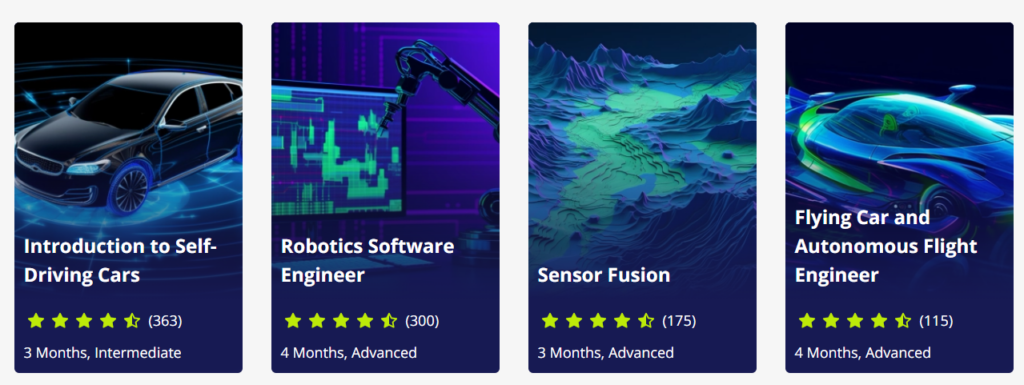
Coursera Overview:
Coursera, founded in 2012, is an online learning platform that partners with top universities and organizations worldwide to offer a wide variety of courses. Unlike Udacity, Coursera focuses on more traditional academic learning and offers Massive Open Online Courses (MOOCs), as well as fully accredited bachelor’s and master’s degrees.
Coursera provides courses in a broad range of subjects, including humanities, social sciences, health, and technology. Its partnerships with universities such as Stanford, Yale, and Harvard give learners access to high-quality, university-level content. Coursera’s courses range from short-term learning experiences to degree programs that take several years to complete.
Target audience: Learners seeking formal education credentials, including certificates, diplomas, or degrees in various fields
Primary focus: A wide range of academic and professional subjects
Learning style: Theoretical learning with some practical applications
Signature offering: Degrees and professional certificates from top universities
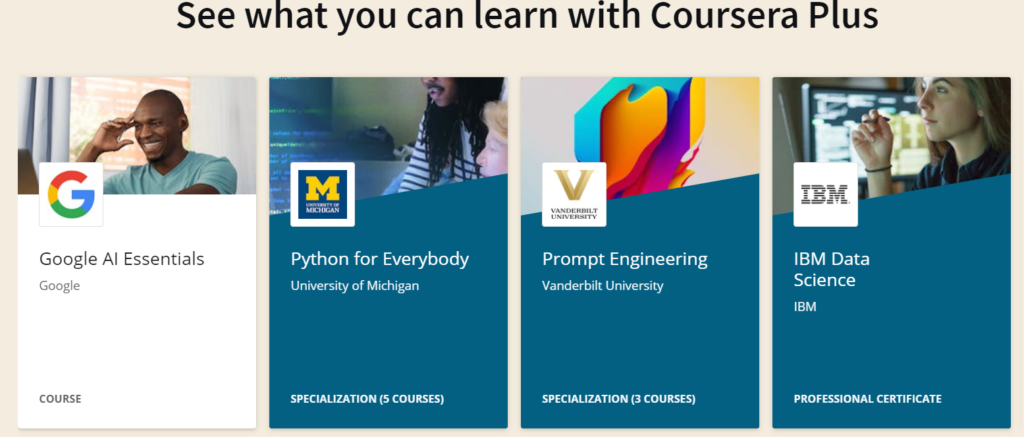
Target Audience:
- Udacity is best for learners looking to gain practical, hands-on skills in technology and business fields, especially if you’re aiming to enter the workforce quickly.
- Coursera appeals more to learners looking for academic qualifications, as well as those seeking degrees or more theoretical knowledge across various subjects, including humanities, science, and technology.
Udacity and Coursera Features
Udacity Features:
- Nanodegree Programs:
Udacity’s signature offering is the Nanodegree. These programs are designed to provide in-depth learning in high-demand areas such as programming, data science, cloud computing, artificial intelligence, and more. They typically last between 3-12 months and include practical projects to build job-ready skills. - Industry Collaborations:
Udacity partners with companies like Google, IBM, and Amazon to create courses that are directly relevant to current job market needs. These partnerships ensure that the content stays updated and aligned with industry requirements. - Career Services:
Udacity provides personalized career support for students, including resume reviews, LinkedIn profile optimization, interview preparation, and portfolio building. - Project-Based Learning:
All courses, especially Nanodegrees, are centered around real-world projects that allow learners to apply their skills in practical scenarios. This hands-on approach makes Udacity a good choice for people looking to build a strong portfolio.

Coursera Features:
- Academic Partnerships:
Coursera offers courses developed by leading universities and organizations like Stanford, Yale, Google, and IBM. This gives learners access to high-quality, university-level content. - Wide Range of Subjects:
While Udacity focuses primarily on technology and business, Coursera covers a broad array of subjects, including humanities, social sciences, health, mathematics, and much more. - Degrees and Certifications:
In addition to individual courses, Coursera offers professional certificates, MasterTrack certificates, and fully accredited bachelor’s and master’s degrees from partner universities. This makes Coursera ideal for learners looking for formal academic qualifications. - Flexible Learning Options:
Coursera allows learners to audit courses for free, but for those looking to earn a certificate or degree, they offer paid options. Many courses also offer financial aid for eligible learners.
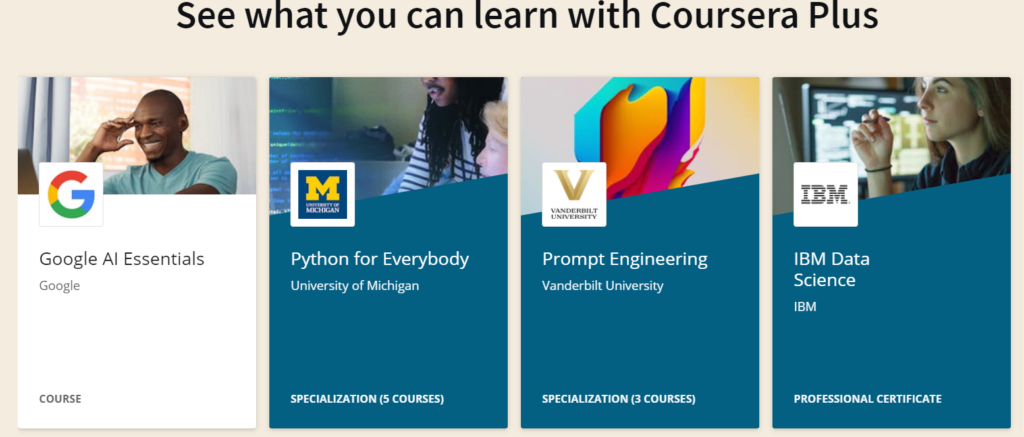
Key Comparison of Features:
- Hands-on Learning: Udacity excels in offering project-based, hands-on learning for job-specific skills, while Coursera’s courses are more academically focused, making it a better fit for learners looking for a deep theoretical understanding or formal credentials.
- Career Support: Udacity stands out for its career services, offering direct support like interview prep and job search assistance, while Coursera focuses more on offering degrees and certificates.
Udacity and Coursera Pricing
Udacity Pricing:
- Nanodegree Programs: Udacity uses a subscription-based pricing model. It costs $399 per month for a Nanodegree. Many students complete Nanodegree programs in about 3-6 months, meaning the total cost can range from $1,200 to $2,400.
- Free Courses: Udacity offers some free courses, but they lack the depth and support of paid Nanodegree programs.
- Scholarships: Udacity also offers scholarships for some of its programs, aimed at underrepresented groups or individuals who cannot afford the full price.
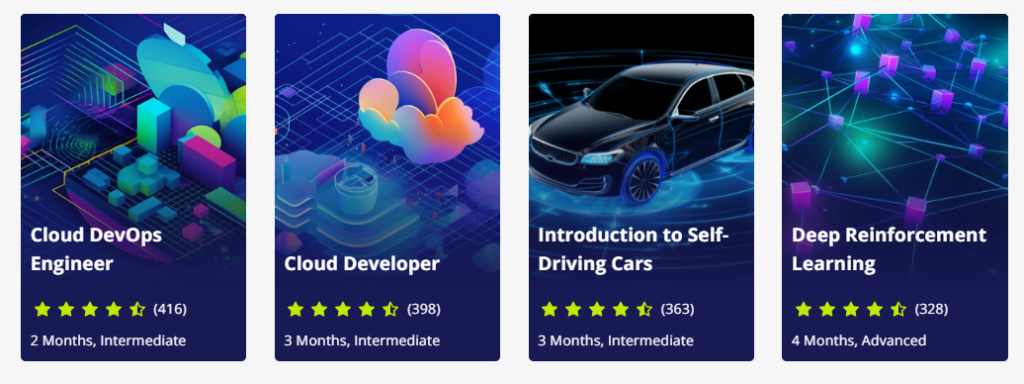
Coursera Pricing:
- Individual Courses: Coursera offers free courses to audit, but for those who want a certificate, the prices range from $39 to $79 per course.
- Specializations: These are collections of related courses designed to deepen expertise in a specific area. They are available via a subscription, typically costing $39 to $89 per month.
- Degrees and Professional Certificates: Coursera offers university-level degrees and professional certificates that can cost anywhere from $2,000 to $25,000, depending on the program and the university. Financial aid is available for eligible students.

Key Comparison of Pricing:
- Cost: Coursera offers more flexible and affordable options, especially for individual courses or those who just want to audit without earning a certificate. Udacity, while more expensive, provides more intensive, job-focused programs.
- Free Access: Both platforms offer free courses, but Coursera has a much wider selection available for free auditing, while Udacity’s free options are more limited in scope and depth.
FAQ: Udacity vs. Coursera
What are the key differences between Udacity and Coursera?
Udacity focuses on practical, job-ready skills, particularly in technology and business, through its Nanodegree programs. It emphasizes hands-on, project-based learning and offers strong career support services.
Coursera, on the other hand, offers a broader range of subjects, including humanities, social sciences, and health, in addition to tech and business. It provides both free courses and full academic degrees in partnership with leading universities.
Which platform is better for getting a job?
Udacity is generally better for job preparation in tech fields, thanks to its project-based learning approach, Nanodegree programs, and career services such as resume reviews and interview preparation.
Coursera also offers career-oriented certificates and degrees, but its focus is more on academic learning, making it a good option for those seeking formal credentials.
Can I get a degree from Udacity or Coursera?
Coursera offers bachelor’s and master’s degrees from universities like Stanford, Yale, and others. These degrees are fully accredited and recognized.
Udacity does not offer traditional degrees. However, its Nanodegree programs are highly regarded in the tech industry and are designed to boost employability.
Are there free courses on Udacity and Coursera?
Yes, both platforms offer free courses.
On Udacity, the free courses are limited in number and often lack the support and depth found in paid programs.
Coursera offers a larger selection of free-to-audit courses. However, if you want to earn a certificate, you’ll need to pay a fee.
How do the prices compare?
Udacity’s pricing for its Nanodegree programs starts at $399 per month, which can be expensive but offers career-focused content.
Coursera offers a more affordable range of pricing, with certificates starting at $39 per course and full degree programs ranging from $2,000 to $25,000. Coursera also provides financial aid for many of its paid courses.
Which platform is more flexible in terms of learning pace?
Both platforms offer self-paced learning, but Coursera provides more flexibility, especially with its free-to-audit courses and broader range of short-term learning options.
Udacity’s Nanodegree programs are also flexible but often come with a suggested timeline to complete the course within a few months.
Do Udacity and Coursera offer career services?
Udacity is known for its career services, which include resume reviews, LinkedIn optimization, and interview prep. These services are available to students who complete Nanodegree programs.
Coursera doesn’t offer as much hands-on career support, but many courses, especially professional certificates, include career guidance and access to job resources.
Which platform is better for tech and business courses?
Both platforms offer excellent tech and business courses.
Udacity is particularly strong in tech fields like data science, programming, AI, and cloud computing, thanks to its partnerships with leading tech companies.
Coursera also offers excellent tech and business courses, but its focus includes a wider range of academic subjects beyond tech.
Are there certifications available on both platforms?
Yes, both platforms offer certificates upon course completion.
Udacity provides certificates for its Nanodegree programs, which are highly valued in the tech industry.
Coursera offers professional certificates and degrees from top universities, which are recognized in both academic and professional settings.
Is financial aid available on Udacity and Coursera?
Yes, both platforms offer financial aid.
Udacity provides scholarships for its Nanodegree programs, often aimed at helping underrepresented groups or those in need.
Coursera offers financial aid for most paid courses and degrees, making it more accessible for learners on a tight budget.
Can I take multiple courses at once?
Yes, both platforms allow you to enroll in multiple courses at the same time.
On Udacity, if you’re paying for a Nanodegree, you’re encouraged to focus on completing it within a few months, but you can take other courses too.
On Coursera, you can audit several courses simultaneously or work toward multiple certificates, depending on your goals.
Which platform offers better support for learners?
Udacity excels in personalized support, especially for Nanodegree students, offering mentor guidance, career services, and project feedback.
Coursera provides support through its partner institutions, but it’s often more generalized and may not be as hands-on as Udacity’s support system.
Conclusion
Udacity and Coursera are both excellent online learning platforms, but they serve different needs.
- Udacity is ideal if you want to learn practical, hands-on skills, especially in tech-related fields like AI, data science, or programming. Its Nanodegree programs provide intensive learning experiences designed to prepare you for the workforce. Udacity also offers strong career services to help you land a job after completing your courses.
- Coursera is better for learners looking for a more academic approach or those seeking formal degrees or professional certificates. With partnerships with top universities and a broad range of subjects, Coursera offers more diverse options for both casual learners and those looking for long-term academic progress.
When choosing between the two, consider your goals. If you need job-specific skills and career support, Udacity might be the right choice. If you’re looking for a university-level education or a broader range of courses, Coursera will likely suit your needs better.


